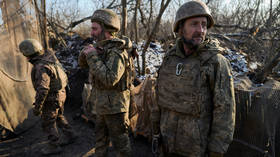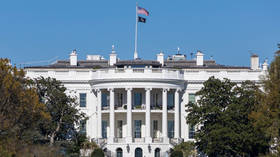Minneapolis prosecutor calls pulmonology expert to throw some light on murder charges against Derek Chauvin
Expert pulmonologist Martin Tobin has cast doubt on claims by Derek Chauvin's lawyers that George Floyd was already in respiratory distress when the former Minneapolis cop began deploying the controversial restraint.
Floyd died “from a low level of oxygen,” Tobin pronounced during expert testimony on Thursday, as the hearings against ex-officer Chauvin entered their ninth day. Tobin explained that there was “damage to his brain as you can see,” adding that this triggered a type of arrhythmia that caused the victim’s heart to stop.
The prosecution has called expert witness, Dr. Martin Tobin, a prominent pulmonologist who wrote a textbook considered “the Bible on mechanical ventilation.” All this just to prove to the jury that Derek Chauvin killed George Floyd. pic.twitter.com/F4w6mb8feD
— Keith Boykin (@keithboykin) April 8, 2021
“A healthy person subjected to what Floyd was subjected to would have died as a result of what he was subjected to,” Tobin argued. His testimony contradicted that of some other witnesses in the trial – specifically concerning Floyd’s drug use. Previous questions from the defense had focused on Floyd’s addiction, and even his girlfriend Courteney Ross described the pair falling in and out of prescription opioid use and regularly dabbling in the illicit market.
The low level of oxygen in Floyd’s blood was due to shallow breathing, Tobin said, suggesting his heart was unable to pump the air through to the bottom of his lungs down to the essential area of oxygen absorption and hence through the rest of the body.
While high blood pressure and heart disease, fentanyl and methamphetamine use were listed as contributing causes on Floyd’s original death certificate, the chief cause was recorded as “cardiopulmonary arrest complicating law enforcement subdued, restraint, and neck compression."
Floyd also tested positive for the coronavirus, but while Covid-19 has dominated the national conversation in the US over the past year, it has gone surprisingly unmentioned throughout the trial so far.
Also on rt.com ‘Don’t be surprised if buildings burn’: BLM activist warns ‘all hell will break loose’ if Chauvin acquitted of George Floyd murderGiven the amount of chaos that Floyd's death ignited, Minneapolis didn’t really have a choice but to try Chauvin, along with his three colleagues who were involved in the arrest, Thomas Lane, Tou Thao, and J. Alexander Kueng.
Chauvin faces counts of second and third degree murder, as well as second-degree manslaughter. The body cameras of Lane, Thao and Kueng helped flesh out the details of what happened right up to Floyd’s death, and they were charged with aiding and abetting second degree murder and manslaughter.
The official autopsy suggested Floyd was killed by police – a simple homicide – while they were restraining him, suggesting Chauvin’s knee continued to hold Floyd down while every last molecule of oxygen was pressed out of the much larger man. Tobin’s testimony agreed with that report, revealing that Chauvin was still applying pressure to the back of Floyd’s neck for over 3 minutes after he’d already stopped breathing.
Also on rt.com Neck restraint used on George Floyd ‘absolutely’ violated dept policy, Minneapolis police chief says in Chauvin trialTobin is considered such an expert on the subject that one of his eight books is referred to as “the Bible of mechanical ventilation” and he has written nearly 750 medical articles on various aspects of respiration.
Earlier this week, Minneapolis’ longest-serving police officer, Lieutenant Richard Zimmerman, also took the witness stand at Chauvin’s trial, insisted that he and other officers had been trained to avoid neck holds due to their danger of killing the suspect. Along with 14 other officers, Zimmerman signed a letter acknowledging the excessive force by the police had been totally unnecessary, from the moment Chauvin put his knee on Floyd's back.
Think your friends would be interested? Share this story!













